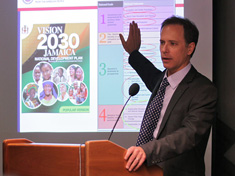-
John Furlow on Better Coordination for Better Climate Adaptation
August 28, 2015 By Carley Chavara “We [need to] stop treating ‘adaptation’ like a sector,” says John Furlow, climate change specialist at the U.S. Agency for International Development (USAID), in this week’s podcast, “but start treating it as a stress or a risk that undermines the development sectors, the environmental sectors, the social sectors that we care about.”
“We [need to] stop treating ‘adaptation’ like a sector,” says John Furlow, climate change specialist at the U.S. Agency for International Development (USAID), in this week’s podcast, “but start treating it as a stress or a risk that undermines the development sectors, the environmental sectors, the social sectors that we care about.”“We [need to] stop treating ‘adaptation’ like a sector,” says John Furlow, climate change specialist at the U.S. Agency for International Development (USAID), in this week’s podcast, “but start treating it as a stress or a risk that undermines the development sectors, the environmental sectors, the social sectors that we care about.”
At the 2010 United Nations climate summit in Cancun, member states began formulating National Adaptation Plans (NAPs) with the goal of integrating climate-related disaster risk reduction with development goals in the least developed countries.
“The objectives of NAPs is to reduce vulnerability and to do so by integrating climate adaptation into other things we do,” says Furlow. “The way to do that effectively is not to have an isolated adaptation strategy or an isolated plan but to weave climate into the things that drive actual decision-making and investments.”
However, making structural changes is often easier said than done. “[US]AID and most development agencies are still structured to do deal with things one issue at a time,” says Furlow. Climate adaptation demands more cross-sectoral efforts, including “bridging the gap between the development and the humanitarian assistance budgets.”
A significant challenge is the power difference between environment ministries and other government bodies. “How do you get the relatively weak environment ministry to get the big, powerful ministries – finance, planning, agriculture, transportation, energy, tourism – to think about climate change when we’ve all sort of been indoctrinated that climate is an environment thing?” he says.
Within and Between Governments
One strategy piloted by USAID is to hold high-level climate and development workshops with government officials from many different agencies. By the end of first workshop, in Jamaica, Furlow says the minister of finance, initially hesitant to participate, wanted to know why he wasn’t informed about climate change risks years ago. “Often the coordination barrier is not that high, it’s just getting the right three people in the room together.”
The broad effects of climate change demand more cooperation at an even higher level as well, says Furlow. As developing countries write and implement their National Adaptation Plans and aid organizations do more on climate, governments and donors need mechanisms to share lessons learned and strategies to avoid overlap and maximize results.
We were both supporting a beach replenishment project on the same beach and didn’t know itTo encourage international cooperation, the NAP Global Network was launched at the 2014 UN climate conference.
“We want to enable countries to learn from each other,” says Furlow. “There is no defined template for a national adaptation plan…[and] there is a discomfort with some of the developing countries that it’s not clear what their NAPs should look like or when it’s going to be done or what they have to do with it.” The NAP Global Network hosted its first Targeted Topics Forum in July for national leaders in climate policy, finance, and other departments.
Donor countries can also do much more to synchronize their efforts and increase climate-sensitive planning, Furlow says. “We are trying to find out how we can provide support, how we can coordinate with each other.”
For example, at an initial meeting, they “found that USAID and [the UK Department for International Development] were both supporting a beach replenishment project on the same beach and didn’t know it, and we had been working there for several years, and this government of this country was still issuing sand mining licenses for the same beach.”
John Furlow spoke at the Wilson Center on July 28.
Friday Podcasts are also available for download on iTunes.
Sources: NAP Global Network, United Nations Framework Convention on Climate Change, U.S. Agency for International Development.
 A Publication of the Stimson Center.
A Publication of the Stimson Center.

 “We [need to] stop treating ‘adaptation’ like a sector,” says John Furlow, climate change specialist at the U.S. Agency for International Development (USAID), in this week’s podcast, “but start treating it as a stress or a risk that undermines the development sectors, the environmental sectors, the social sectors that we care about.”
“We [need to] stop treating ‘adaptation’ like a sector,” says John Furlow, climate change specialist at the U.S. Agency for International Development (USAID), in this week’s podcast, “but start treating it as a stress or a risk that undermines the development sectors, the environmental sectors, the social sectors that we care about.”

